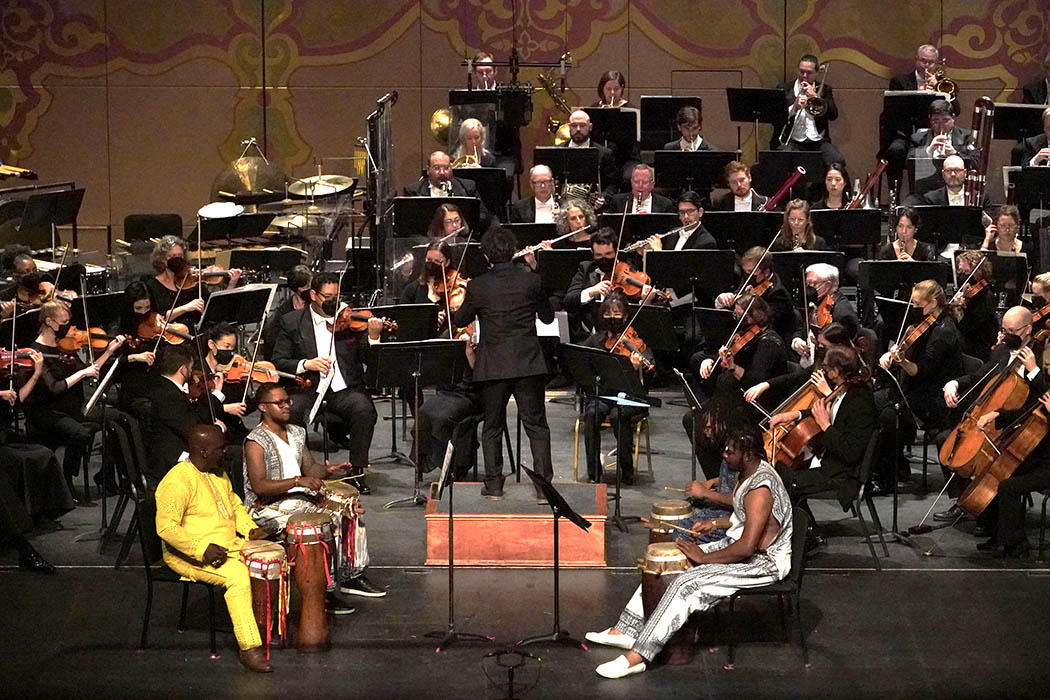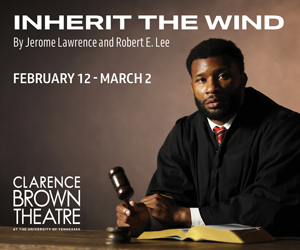In days of yore—which now includes anything prior to the pandemic shutdown—one could count on the Knoxville Symphony Orchestra for a season-ending concert that somehow included both an energetic musical experience and an emotional one. Heartstrings were often tugged mercilessly and audiences generally went home energized, yet satiated, holding fond memories of the season’s concerts. After a two year absence of big thematic finales, Maestro Aram Demirjian and the KSO took a fascinating stylistic turn in last weekend’s Masterworks closer and offered a rhythm-centric program that brilliantly succeeded on a number of levels, not the least of which were admiration for musicianship and sheer boatloads of entertainment.
The evening’s four works had both similarities and differences, but each made bold statements of style and offered a feast of showcase opportunities for both the KSO players and guest artists. And in each, drums, either texturally or rhythmically, were absolutely fundamental to their heart and soul. Demirjian opened the concert with Drums: A Symphonic Poem by jazz pianist and composer, James P. Johnson. Often mentioned as “the greatest jazz pianist you’ve never heard of…”, Johnson is yet another African-American composer finally getting his due, albeit almost 70 years after his death. The work oozes energy and driving motion with harmonies that brush up against the European classical tradition and dissonant modernism, as well as reflecting American show music, without ever losing its jazz theme and variations basis.
The featured work on the first half of the evening brought the Knoxville-based drum quartet Indigenous Vibes to the stage for Sabar: Concerto for African Drums and Orchestra by James DeMars. Sabar refers to a traditional drum from Senegal that is played with one hand and one stick. The four-movement DeMars work combines Sabar drums as solo instruments with an orchestral score that is beautifully cross-cultural in both its rhythmical impact and in percussive texture. While successful fusion works that feature non-western instruments against a traditional orchestral background are relatively rare, this concerto is certainly a contender for one that seems to intrigue the audience in whatever musical niche they inhabit.
Indigenous Vibes consists of Obayana Ajanaku and three of his former Austin-East percussion students JaDarius Fuller, Jamarr Underwood, and Jaylon Toms.
The second half of the program took yet another turn with Duke Ellington’s suite version of Black, Brown, and Beige, composed originally for his Carnegie Hall performance with his orchestra in 1943. The suite consists of the commanding first movement of the longer work of the same name, itself having three sections: “Work Song”, “Come Sunday”, and “Light”. The work is awash with addictive melodic tunes that are made infinitely intriguing by jazz harmonies and instrumental textures.

As if the evening’s KSO players had not had enough showcase opportunities, Demirjian concluded with what is probably the ultimate showcase work for instrumentalists, Maurice Ravel’s Bolero. Originally conceived as a ballet for dancer Ida Rubenstein, the work is now known for its seductive repetition that draws in the listener with a gradual crescendo and layer upon layer of instrumental textures. The snare drum’s unflagging rhythm and the orchestra’s ever-increasing volume produce a pre-orgasmic musical tension that seems unsustainable—which it is. A sudden key change to E major is like a rush of fresh air, but this is contorted by spasms of luscious dissonance that then give way to the final joyous resolution. Clearly, a fitting finale to the 2021-22 season.
As mentioned, the entire evening of four works was filled with delicious solo turns by the KSO wealth of talent: snare drummer in Bolero, Clark Harrell; Principal Flute Devan Jaquez along with section members Jill Bartine and Cynthia D’Andrea; Principal Bassoon Justin Cummings; Principal Clarinet Gary Sperl; Principal Oboe Claire Chenette; Ayca Yayman on oboe d’amore in Bolero; Elizabeth Merrill on English horn; Principal Trombone Samuel Chen in a magnificent Bolero turn; Principal Trumpet Phillip Chase Hawkins; Principal Horn Jeffery Whaley and his horn section; saxophonists Nathan Keedy and John Cippola; Principal Cellist Andy Bryenton; and Concertmaster William Shaub. And “tugging at the heartstrings”—during its milestone mentions for orchestral players, the KSO announced two retirements from the orchestra: Eunsoon Lee-Corliss after 37 years, and cellist D. Scot Williams after 45 years.






